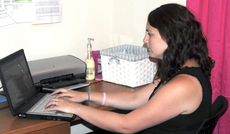The Office of Housing and Resident Life and University Computing Services are working on a solution for the slow campus Internet for residents.It’s no secret that the students who live on campus have been complaining about the wireless Internet. Some residents in La Maison Du Bayou have taken it one step further by starting a petition to get better connections.
A Facebook page has also been created to support this cause. The description of this page reads, “This is another form of a petition against the bad internet that has plagued the apartments for over a year.”
Spencer Bartholomew, computer information system junior from Vacherie, has been living at La Maison for three years.
“The problem has been there since the beginning,” Bartholomew said. “There has been small progression since I first got here, but the problem is definitely still there.”
Bartholomew said that he signed the petition after it began about two weeks ago. Bartholomew said that so far, the issue is just being patched instead of fixed.
“The problem is that the Internet is slow and inconsistent,” Bartholomew said. “The first two weeks of school were perfect. Ever since it went down a few weeks ago, it has been bad.”
Alex Bernard, a student worker at La Maison and sophomore in Athletic Training from Franklin, said that the problem has been reported.
“We get complaints from the residents, and then we have to report it to someone else,” Bernard said. “I feel for them.”
“All we can do is report to University Computing Services in order to try and get the problems resolved,” Lisa Grubbs, assistant director of Housing and Resident Life, said.
Kim Montague, director of Housing and Resident Life, said that the solution is still being decided on.
“In terms of the petition: If we have problems, I don’t care if we get a petition from students,” Montague said. “Whether it’s one student or 230, we need to solve the problem.”
In an e-mail from Slade Besson, assistant director of Computer Services, to Charles Ordoyne, director of Computer Services, possible solutions were discussed.
“Currently, the University pays for two different 45 megabytes-per-second Internet links for $6,380 per month for a total of $12,760 per month,” Besson said.
The two networks are independent of each other. One network belongs to housing while the other goes to administration.
“Housing had approached me to look at increasing the bandwidth from 45Mbps to 100Mbps,” Besson said.
Besson said this would increase the monthly charge from $6,380 to $8,391 per month for a single 45Mbps unit.
Besson then proposed merging the two networks to form one large one.
“I would like to request that we purchase one 250Mbps connection for 13,885 per month for the new combined network,” Besson said.
Besson said this would increase the total monthly cost for Internet by $1,125. It would be divided between housing and the administration for increases of $562.50 per month each.
The upgrade would also require a one-time purchase of new equipment for housing.
“The increased bandwidth would require an upgraded firewall at a cost of $10,700 on state contract and a new bandwidth shaper at a cost of $4,300 on state contract,” Besson said. “The administrative network is ready for the upgrade now with no one-time costs.”
There are other possible solutions for the issue, but a final decision has not yet been made.








